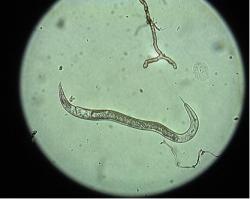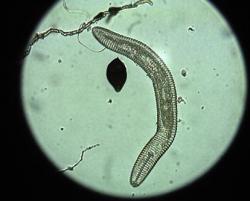Nematology Lab
Our program focuses on plant-parasitic nematodes, which are persistent and often serious pathogens of many New Mexico crops. The most economically-damaging nematode in the state is the southern root-knot nematode, Meloidogyne incognita. It is widely distributed and, without proper management, can result in yield losses that exceed 40% in chile and 25% in cotton and many other annual crops. Other root-knot nematodes, including M. chitwoodi and M. partityla are less widely distributed but serious pests of potato and pecan. The northern root-knot nematode, M. hapla, can damage peanut, chile, and bean crops in eastern NM. In addition to crop damage, the presence of some of these nematodes results in regulatory restrictions on the shipment of NM produce. Historically, nematodes have been managed with pesticides, but the availability of such materials to producers in NM and elsewhere have dwindled by 80% in recent years due to environmental concerns. As the expense of pesticide-based management has increased, so has the level of nematode damage to many crops.
Our program addresses a broad range of topics and strives to: determine how plant-parasitic nematodes interact with other pests and pathogens such as annual and perennial weeds and Verticillium dahliae; help develop sustainable management alternatives for pest complexes; enhance the efficacy of existing management options; determine relationships among various nematode trophic groups and soil and plant health; evaluate the host status of important Southwestern ornamental plants; educate the agricultural community and homeowners regarding ways to manage existing nematode pathogens and avoid introducing new ones. Most of our research is interdisciplinary and collaborative.

